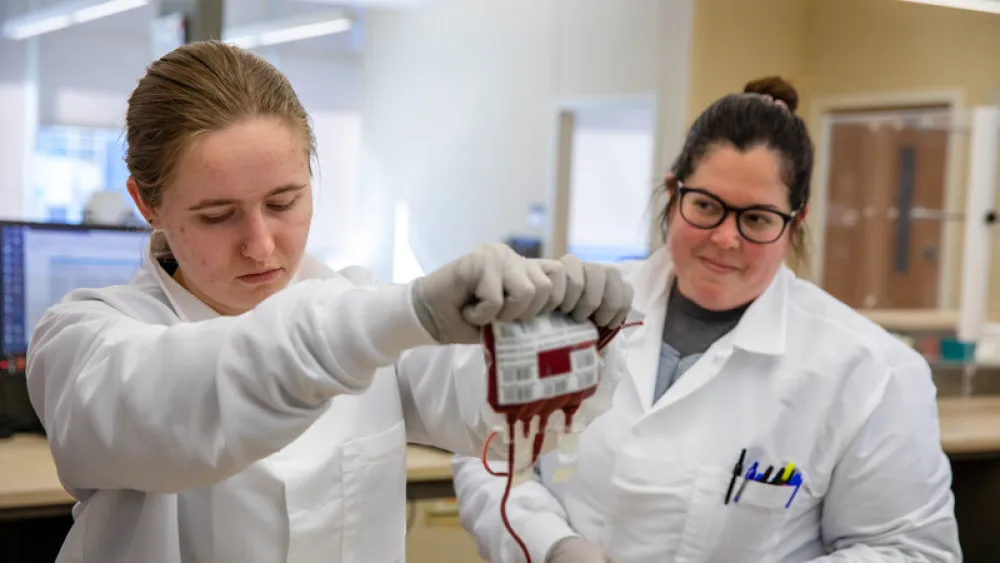




Today's Medicine
Effective and efficient communication between Methodist Blood Bank and Surgical Services helps save lives
Published: Jan. 24, 2024

“There’s no substitute,” said Nancy Strong, MS, MT(ASCP) BBCM. “We rely heavily on people donating whenever they’re able.”
As a technical coordinator of the Methodist Blood Bank at the Methodist Pathology Center-Schenken Pavilion, Strong knows the importance of having the necessary amount of blood products, especially in emergency situations.
“When these patients need blood, they truly need it,” said Crystal Cover, BSN, RN, a nurse coordinator for Methodist Hospital’s Surgical Services. “It’s not a ‘just in case’ scenario.”
“You never know when you or a family member might be the one in need of that product that is going to help get them through a crisis and keep them alive,” Strong said.
Building the bank
During the winter, especially around the holidays, the number of blood donations is typically lower than during other parts of the year. This can lead to blood suppliers having to keep close tabs on the amount of products they distribute.
But blood products are vital throughout the entire year. Last year, 4,997 red blood cell units – roughly a pint of blood in each unit – and 1,061 units of platelets were transfused into patients at Methodist Hospital and Methodist Estabrook Cancer Center. The hospital and cancer center are each just a short walk from the pathology center.
The Methodist Blood Bank, which serves patients at Methodist Hospital, Methodist Women’s Hospital, Methodist Estabrook Cancer Center, Children’s Nebraska and Midwest Surgical Hospital, receives blood products from the Nebraska Community Blood Bank (NCBB).
The Methodist Blood Bank has a standing daily order of platelets, which are essential for patients undergoing cancer treatment or open-heart surgery. The platelets are good for seven days before they expire, and by the time the Blood Bank receives them from NCBB, they might have only three or four days remaining to use them.
Red blood cell units are good for 42 days, so the Blood Bank usually has the necessary supply. But the bank’s O-negative supply may dwindle if the product has been used in a pinch because it’s the universal blood type.
An online ordering system allows the Blood Bank to order what it needs before running out of supply, but there are dire situations for specific blood products. In these high-pressure situations, the Blood Bank calls NCBB for an urgent order.
Luckily, the NCBB depot in Omaha is located at 12100 Pacific Street, about a 10-minute drive from the Methodist Hospital campus, which means necessary product can arrive in a timely manner.
Strong recalled one instance when product was urgently needed and NCBB arrived at the Blood Bank about 20 minutes after the initial communication.
She believes that NCBB understands the hospital’s needs and provides excellent customer service.
“That’s always the challenge – making sure that we have the right product for the right patient and in the right amount of time when life is hanging in the balance,” she said.
Terrific teamwork
Collaborative communication between the Blood Bank and the Methodist Hospital Surgical Services team is essential to making sure patients’ needs are met.
“The teamwork is incredible,” said Cover, who has worked 10 years in a variety roles throughout surgical services. “And when you have that good teamwork and know exactly what and when you’re supposed to do, it leads to great patient outcomes.”
For routine surgeries, the Blood Bank tests a patient’s blood type and completes an antibody screen during the preoperative stage to make sure it has blood that’s compatible. If the antibody test comes back with a result saying that the matching blood isn’t in inventory, the Blood Bank calls the hospital to see if it needs to reschedule the procedure. The prescreening can also indicate if the patient is healthy enough for surgery.
Additionally, the operating room (OR) will send orders to the Blood Bank if the team knows there’s a high-risk patient or a potentially difficult surgery, such as one involving a vital organ.
After receiving the order, the Blood Bank pulls the necessary product and packs it into a cooler for someone from the surgery team to retrieve. This process takes about 15-20 minutes from the time the order is made to the product making its way to the OR. This blood may or may not be used, but the product is ready if it’s needed.
During times of an immediate transfusion when the blood won’t be sitting around, the Blood Bank will send the blood to the surgery department through a tube system — similar to what is used at a drive-thru bank. This speeds up the delivery process to less than five minutes.
In emergency situations, the communication is much quicker and more precise. A phone call between the OR and Blood Bank may last only five seconds to communicate what is needed and how much.
“Sometimes you have to be blunt in those situations,” Cover said. “But there aren’t any hard feelings because people understand it’s not the time or place to have those feelings. It’s all about the patient.”
As the Blood Bank is finding the necessary product, a staff member from Surgical Services runs over to the lab to retrieve it. If initial testing was completed, the correct match can be handed off. But there are situations when the Blood Bank relies on its supply of universal O-negative blood.
Finally, during mass transfusion situations, such as major artery bleeds, a nurse is bedside holding pressure on the area of the bleeding, and the coordinating nurse sends someone to the Blood Bank to get as many units of blood as they can as someone else from the OR staff places a call. When a runner gets back to the OR, they ask if more is needed and might head back to the Blood Bank to be on standby.
“We’ve built a really good relationship, understanding how both sides of the street work,” Strong said.
And because of that rapport, patients are able to receive necessary blood products in a timely manner.
“At the end of the day, we’re able to send people back to their families because they received the blood they needed,” Cover said.
More Resources
- Schedule an appointment today to donate blood.
- First time donating? Here’s what you should know before you go.
- Learn more about the Methodist Pathology Center-Schenken Pavilion.


